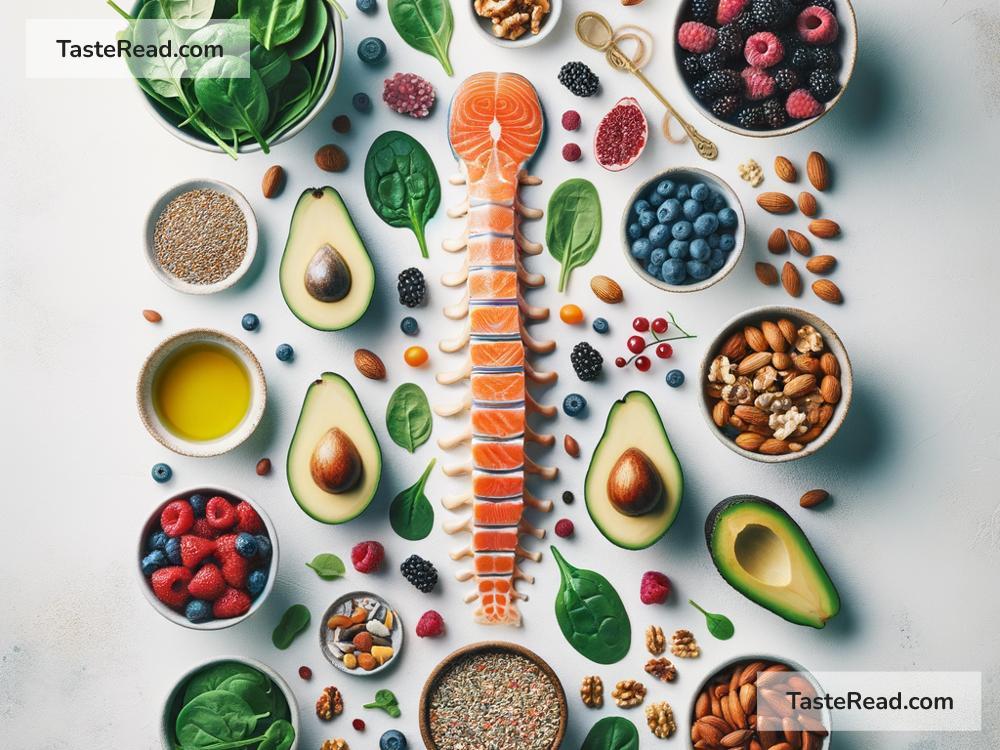Foods That Support Spinal Health: Eat Your Way to a Stronger Back
Your spine is the backbone of your body, quite literally! It holds you up, allows you to move, and protects your spinal cord, which connects your brain to the rest of your body. Maintaining spinal health is crucial for a pain-free and active life. While exercising and good posture play important roles, did you know that the food you eat can also impact your spine? Eating the right kinds of nutrients can strengthen your bones, discs, and muscles, reduce inflammation, and help prevent spinal problems. Let’s explore which foods are best for supporting spinal health!
1. Calcium-Rich Foods for Strong Bones
Calcium is the superstar nutrient for healthy bones, including the vertebrae of your spine. Bones in the spine need calcium to maintain their strength and prevent conditions like osteoporosis, which can weaken them and cause fractures.
Some great sources of calcium include:
– Dairy products like milk, yogurt, and cheese.
– Leafy green vegetables such as kale, broccoli, and spinach.
– Fortified foods like calcium-enriched orange juice or cereals.
– Nuts and seeds, especially almonds and sesame seeds.
If you’re lactose intolerant or vegan, don’t worry—many plant-based foods and fortified products can give you the calcium your bones need!
2. Vitamin D: Calcium’s Best Friend
Calcium doesn’t work without vitamin D. Vitamin D helps your body absorb calcium, making it essential for maintaining bone density. Without enough vitamin D, your spine’s bones can become weak over time.
Make sure to include these vitamin D-rich foods:
– Fatty fish like salmon, tuna, and mackerel.
– Egg yolks.
– Mushrooms that have been exposed to sunlight.
– Fortified foods like milk, cereal, and plant-based milk alternatives.
You can also help your body make vitamin D naturally by spending time in the sunshine!
3. Magnesium for Bone and Muscle Health
Magnesium is another key mineral that keeps your spine healthy. It supports bone strength, helps relax tight muscles, and contributes to the overall function of your spine. Magnesium also plays a role in preventing inflammation, which can lead to back pain.
Load up on magnesium with these foods:
– Nuts and seeds, such as almonds, cashews, sunflower seeds, and pumpkin seeds.
– Whole grains, like brown rice, quinoa, and oats.
– Legumes, including black beans, chickpeas, and lentils.
– Dark chocolate (as an occasional treat!).
4. Omega-3 Fatty Acids to Combat Inflammation
Inflammation can worsen spinal problems like arthritis, herniated discs, and muscle strain. Omega-3 fatty acids are powerful anti-inflammatory nutrients that can help reduce pain and swelling around your spine while supporting the health of its discs.
You can add omega-3s to your diet with:
– Fatty fish, such as salmon, sardines, and herring.
– Flaxseeds and chia seeds.
– Walnuts.
– Fish oil or algae-based omega-3 supplements (if you need extra support).
5. Vitamin C for Collagen Production
Did you know your spinal discs rely on collagen to stay healthy? Collagen keeps the discs between your vertebrae soft and flexible, helping your spine bend and absorb shock. Vitamin C is the nutrient that helps your body produce collagen.
Stock up on vitamin C by eating:
– Citrus fruits like oranges, lemons, and grapefruits.
– Berries, especially strawberries, blueberries, and raspberries.
– Bell peppers, especially red ones.
– Tomatoes.
Vitamin C also boosts your immune system, which is a bonus!
6. Protein for Muscle Support
Your spine doesn’t work alone—it relies on muscles to provide support and keep everything stable. Eating enough protein helps your muscles stay strong. Protein is also key for repairing tissues if you experience an injury or strain.
High-protein foods to consider:
– Lean meats like chicken, turkey, and fish.
– Eggs.
– Beans and lentils for plant-based protein.
– Greek yogurt.
– Tofu and tempeh for vegetarians.
7. Healthy Fats for Joint Lubrication
Healthy fats keep your joints and spinal discs lubricated, which helps with flexibility and reduces stiffness. They also provide inflammation-fighting benefits.
Include these healthy fats in your diet:
– Avocados.
– Olive oil.
– Nuts and seeds.
– Fatty fish (yes, salmon shows up again!).
8. Water for Hydration
One of the simplest ways to support your spine is by staying hydrated. The jelly-like discs in your spine need water to maintain their shape and functionality. Dehydration can make your discs lose elasticity, increasing your risk of back pain.
Make it a habit to drink plenty of water throughout the day—your spine will thank you!
Final Thoughts
Your spine works hard every day, whether you’re walking, sitting, or bending over to pick up groceries. To keep it strong and healthy, combine a nutritious diet with good posture, regular exercise, and proper care. The foods mentioned above will help fortify your bones, discs, and muscles while reducing inflammation and preventing problems like back pain.
Take charge of your spinal health one meal at a time—your back deserves the support!


